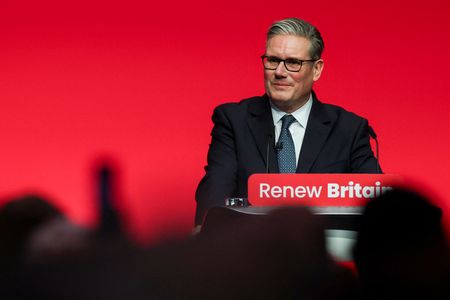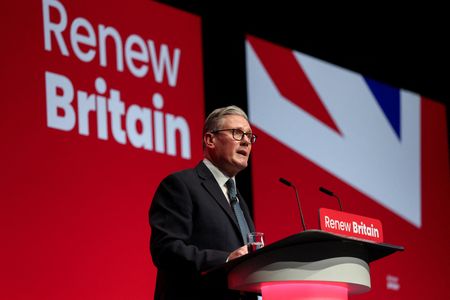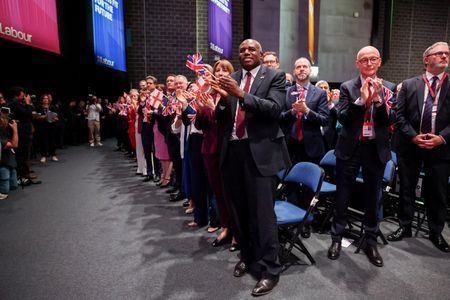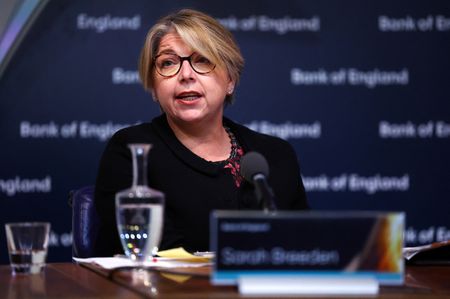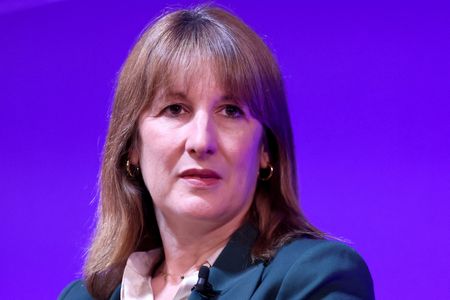By Elizabeth Piper, Alistair Smout and Andrew MacAskill
LIVERPOOL, England (Reuters) -Prime Minister Keir Starmer appealed directly to working-class voters on Tuesday, calling on Labour’s traditional supporters to reject the “snake oil” peddled by the populist Reform UK party and back his vision of “a Britain built for all”.
In the most passionate defence of his premiership since he won a landslide election in July last year, Starmer called for unity, attacking Brexit campaigner Nigel Farage and his Reform party for only being interested in fomenting division.
Under threat from Reform on the right and a nascent leftist party under his predecessor Jeremy Corbyn, Starmer called on voters to be patient with his Labour government, which he said was taking its first steps along the path to “renew Britain”.
And he appealed directly to Britain’s working people, saying he understood their frustrations of being “patronised” by politicians, referring to his late father feeling disrespected for having a manual job rather than a university education – something he pledged to change by promoting technical colleges.
STARMER CALLS FOR FIGHT FOR ‘SOUL’ OF BRITAIN
“No matter how many people tell me it can’t be done, I believe Britain can come together,” he told his party’s second annual conference in the northern English city of Liverpool since winning power last year.
“We can all see our country faces a choice, a defining choice. Britain stands at a fork in the road. We can choose decency, or we can choose division. Renewal or decline,” he said in a challenge to increasingly restive lawmakers who question his leadership after falling behind Reform in the polls.
In a nod to the difficulties he has faced in the first year of his premiership with his personal poll ratings the worst for a British leader since at least 1977, Starmer again committed to raising living standards and putting money in voters’ pockets.
But he also sought to convince them that Labour is the true patriotic party rather than Reform, with officials handing out Britain’s flags to the audience, who waved them during several standing ovations.
“For me, patriotism is about love and pride, about serving an interest that is more than yourself, a common good,” he said. “And the question I ask seriously of Nigel Farage and Reform is, do they love our country … or do they just want to stir the pot of division, because that’s worked in their interests?”
He repeated that his government would tackle the high rates of illegal immigration into Britain but would fight racism and those who “say or imply the people cannot be English or British because of the colour of their skin”.
That focus on fighting Farage was welcomed by many in the packed conference hall.
“Farage doesn’t care about normal people, and it was important we get that message out,” said Shabaan Saleem, a 21-year-old Labour councillor.
But Farage said the accusations of racism had put its supporters in danger.
“To accuse countless millions of being racist is a very, very low blow,” he said. “It directly threatens the safety of our elected officials and our campaigners.”
STARMER FACES DIFFICULT TAX AND SPENDING DECISIONS
Starmer faces some difficult decisions. After saying that last year’s tax rises – the biggest in more than 30 years – were a one-off in terms of scale, the government might be forced to again raise tens of billions of pounds in taxes to cover a forecast fiscal shortfall.
Finance minister Rachel Reeves used her speech at conference to warn those in the party who want her to ease her fiscal rules to spend more on the nation’s ailing economy that they were “wrong, dangerously so”, keeping the door open to tax rises.
And Starmer warned the party that it might face uncomfortable choices.
“It is a test. A fight for the soul of our country, every bit as big as rebuilding Britain after the war, and we must all rise to this challenge,” Starmer said.
“And yet we need to be clear that our path, the path of renewal, it’s long, it’s difficult, it requires decisions that are not cost-free or easy. Decisions – that will not always be comfortable for our party.”
(Reporting by Elizabeth Piper, Alistair Smout and Andrew MacAskill; Additional reporting by William James, Yoruk Bahceli and Catarina Demony Editing by Kate Holton and Jon Boyle)

